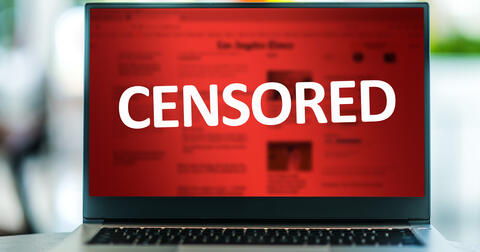Yellow Light: 13 Michigan schools have ambiguous speech policies
‘Yellow light’ policies ‘too easily encourage administrative abuse, arbitrary application’
A new study gave 13 colleges and universities in Michigan a “yellow light” for maintaining “at least one ambiguous policy that too easily encourages administrative abuse and arbitrary application.”
The Foundation for Individual Rights and Expression rated the publicly available student conduct policies at 26 institutions in Michigan, including both private and public ones. FIRE gave them various ratings: red light, yellow light, green light, or a warning.
“A yellow light institution maintains policies that could be interpreted to suppress protected speech or policies that, while clearly restricting freedom of speech, restrict relatively narrow categories of speech,” the report states. “Yellow light policies are typically unconstitutional when maintained by public universities, and a rating of yellow light rather than red light in no way means that FIRE condones a university’s restrictions on speech.”
The report only evaluates written policies and does not measure how the institution applies or upholds its rules on free speech.
FIRE does not rate schools based on averages. A school with several green light policies and one yellow light policy earns an overall rating of yellow. This means that schools can change between categories by reforming policies.
Three of schools evaulated in the report — Saginaw Valley State University, Northern Michigan University and Wayne State University —have several yellow light policies. They cover harassment and internet usage, as well as the posting and distribution of materials.
“We value free speech. In our policies, we respect the First Amendment and strive to maintain a campus culture and environment that is welcoming to all,” J.J. Boehm, a spokesperson for Saginaw Valley State University, told Michigan Capitol Confidential in an email.
Northern Michigan University and Wayne State University did not respond to requests for comment.
Several universities are very close to having a green light rating as an institution. Central Michigan University has bullying and harassment policies that are considered yellow lights.
It also has several green light policies, such as its Code of Student Rights, Responsibilities and Disciplinary Procedures, which states:
As citizens, students have the same duties and obligations as do other citizens and enjoy the same freedoms of speech, press, religion, peaceful assembly, and petition that other citizens enjoy. In all of its dealings with students, the university will respect the rights guaranteed to them by the Constitutions and laws of the United States, the State of Michigan, and local ordinances.
Ari Harris, a spokeswoman for CMU, said the university actively promotes the free exchange of ideas.
“CMU invites members of its community to explore, discuss and challenge ideas, including those related to challenging and/or sensitive topics,” Harris said in an email to CapCon. “These exchanges can take the form of, but are not limited to, classroom discussions, open forums, guest speakers, public debates, demonstrations, marches, tabling and signage, and more. We encourage faculty and students to exercise academic freedom, and we promote active citizenship in all its forms.”
All three of the University of Michigan’s campuses — Ann Arbor, Dearborn, and Flint — are within one or two policy changes of moving from an overall rating of a yellow light to a green light. All of the campuses have a harassment policy that receives a yellow light.
Rick Fitzgerald, a spokesman for the University of Michigan, sent CapCon an excerpt from the school’s Standard Practice Guide. It reads:
Expression of diverse points of view is of the highest importance, not only for those who espouse a cause or position and then defend it, but also for those who hear and pass judgment on that defense. The belief that an opinion is pernicious, false, or in any other way detestable cannot be grounds for its suppression.
Revising restrictive policies is key to maintaining freedom of expression on college campuses.
"Even prior to enforcement, restrictive policies threaten to cast a chilling effect over the expression of students who read them and fear expressing themselves will land them in trouble,” the report states. “Policy revision, therefore, helps improve the overall climate for free expression on campus for all, not just those targeted when a policy is enforced.”
The other yellow-light schools include Western Theological Seminary, Hope College, Eastern Michigan University, Ferris State University, Grand Valley State University and Michigan State University.
“Eastern Michigan University strongly supports free speech and will continue to do so in the future,” EMU said in a statement provided to CapCon.
Mary Eilleen Lyon, a spokeswoman for Grand Valley State University, said that as a public institution, the university protects free expression.
“Our policies on expression and speech reflect the belief that rigorous and respectful debate is welcome on our campus and within our community,” Lyon said in an email.
The other schools did not respond to requests for comment.
Michigan Capitol Confidential is the news source produced by the Mackinac Center for Public Policy. Michigan Capitol Confidential reports with a free-market news perspective.

